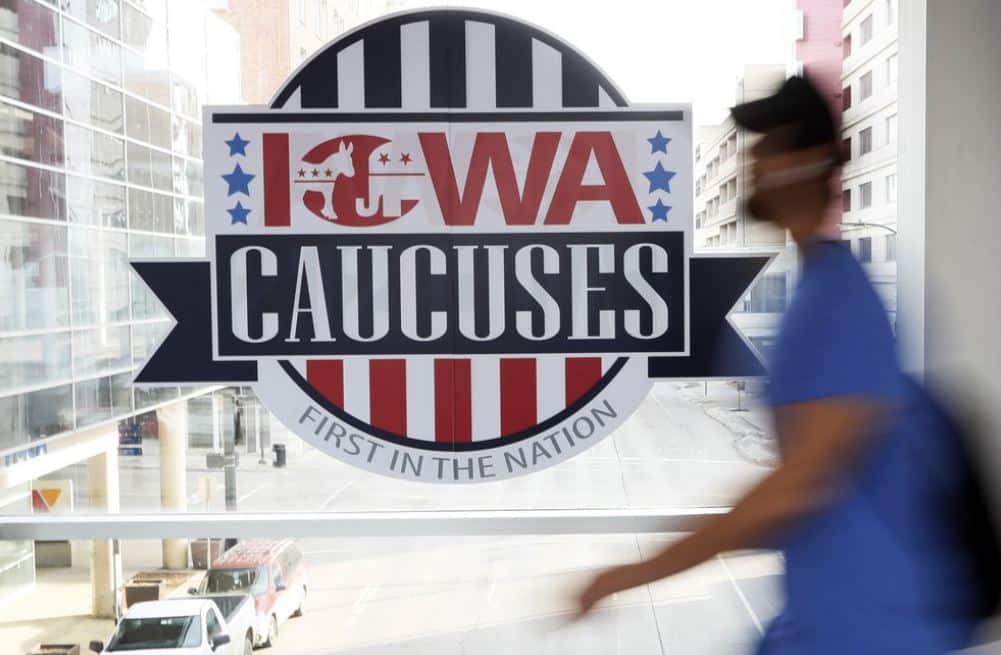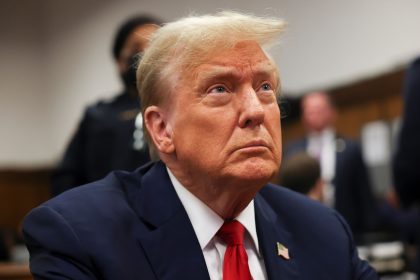Report Says DNC Considering Changes to Presidential Nominating Process
But the Members Doing the Deciding Say ‘Not So Fast’

WASHINGTON — The Democratic National Committee’s Rules and Bylaws Committee is considering a draft resolution that would dramatically shake up the party’s nominating process and put an end to Iowa’s first-in-the-nation caucuses.
A copy of the draft resolution was obtained by the Des Moines Register, which said it corroborated the veracity of the document and first reported the turn of events at the DNC’s annual winter meeting.
But members of the committee diverged sharply on what exactly is up.
James Roosevelt Jr., a co-chair of the Rules and Bylaws Committee, confirmed to the newspaper that there would be a “broad discussion” of the proposed change Friday night, but that he didn’t expect “any final conclusions” to be made.
Another member of the committee, Donna Brazile, the political strategist and two-time acting head of the DNC, told The Well News she hadn’t seen the “so-called proposal” or discussed it with anyone before leaving town to attend this weekend’s New Orleans Book Festival.
Still another member of the committee, Tonio Burgos, shot down the report in its entirety.
“Not true. Not aware. Nothing to discuss at this time,” he said in an email to The Well News.
But member Frank Leone, who goes by @DemRulz on Twitter, where The Well News tracked him down, said, “I’d say no specific change has been proposed and RBC will discuss calendar as well as other delegate selection issues.”
Iowa has had the distinction of being the first state to vote in the presidential election cycle since 1972.
If the proposal currently being discussed at the DNC meeting were to advance, it would significantly alter the party’s presidential nominating calendar, the Des Moines Register said.
Currently, Iowa, New Hampshire, Nevada and South Carolina are at the head of the pack, but, according to the report, none would necessarily be given preferential consideration based on that history over other states that apply to jump ahead.
In some ways, as so much else in American life, the impetus for conversation scheduled to take place Friday night extends back to the 1960s, or more specifically, 1968 and the Democratic Convention that year.
When the convention ended, Vice President Hubert Humphrey was the nominee — over George McGovern and Eugene McCarthy — despite being a latecomer to the contest and not winning a single primary.
Because Humphrey had supported President Lyndon B. Johnson’s execution of the Vietnam War, his nomination divided Democrats and former Vice President Richard Nixon was elected president.
In an effort to mend fences, Democratic party leaders formed the McGovern–Fraser Commission, formally known as the Commission on Party Structure and Delegate Selection, to improve the nomination process so voters would have a direct say as to who would be their nominee for president.
As Jeremy D. Bailey, professor of political science at the University of Houston has written, the commission’s work made Humphrey’s victory the last of the so-called “mixed system” presidential nominations in U.S. history.
Between 1912 and 1968, Bailey wrote, many states held primaries, but most were non-binding contests to determine whom party members preferred.
“Candidates would enter select primaries to demonstrate their strength among voters to party leaders, but a victory in a primary was not a guarantee of the state’s delegates,” Bailey said.
“The commission laid the foundation for the current nominating process, which requires that delegates be awarded based on results in primaries and caucuses. This move democratized the nomination process, taking it away from the control of party leaders,” he added.
One of the mandates of the commission was that state party leaders had to give 30 days notice before hosting primaries or caucuses, encouraging full participation.
Because Iowa had an extraordinarily long nominating process at the time, featuring four statewide events (the caucuses, followed by conventions at the county, congressional district and state levels), the addition of the 30-day notice meant it needed a head start.
As a result, Iowa became the first-in-the-nation contest for the presidency.
Of course, there’s more than pride of place at stake.
A report published by The Daily Iowan, which bills itself as the independent newspaper of the University of Iowa community, found that the 2020 Iowa caucus brought in over $7.2 million in the month preceding the Feb. 3 vote, this estimate based on Federal Election Commission campaign spending data.
That number, the reporter Brian Grace noted, is about 14.7% of the state’s entire gross domestic product in that same month, according to the U.S. Bureau of Economic Analysis.
Alex Wilson, spokeswoman for Catch Des Moines, the city’s convention and visitor’s bureau, said in an email to The Well News that the city estimated an economic impact of $11.3 million leading up to the week of the 2020 caucus.
“The economic impact was much larger as a state for 2020,” she said. “The economic impact and exposure are felt long before the caucuses, with high profile events such as the Polk County Steak Fry, the Liberty and Justice Celebration Dinner, the Iowa State Fair and several debates and countless candidate events bringing in tens of thousands of visitors to Greater Des Moines in the year leading up to the Iowa caucus.”
Greg Edwards, President and CEO Catch Des Moines, said, “Obviously the Iowa Caucus brings in money that greatly benefits the city of Des Moines, but it’s not just about the money.
“Media from across the nation get to experience Des Moines for the surprisingly cool destination that we know it to be. The caucus to us is not just a showcase for the candidates, but a showcase for our community,” he said.
Of course, ancient controversies and economics aren’t the only thing driving whatever discussion is actually happening around the fate of the Iowa caucus. There’s also what happened in 2020, the year smartphone and logistical failures prevented the party from calling the contest in a timely fashion.
In the absence of final results, multiple campaigns claimed victory as they boarded private planes destined for New Hampshire.
Days after the contest, even the Associated Press, which hundreds of news organizations rely on to declare a winner of important electoral contests, declined to do so.
“The Associated Press calls a race when there is a clear indication of a winner. Because of a tight margin between former [South Bend, Indiana] Mayor Pete Buttigieg and Sen. Bernie Sanders, [D-Vt.], and the irregularities in this year’s caucus process, it is not possible to determine a winner at this point,” said Sally Buzbee, AP’s senior vice president and executive editor.
On the Tuesday when Buzbee spoke, four days after the caucus, the results with 97% of precincts reporting had Buttigieg leading Sanders by three state delegate equivalents out of 2,098 counted. That was a margin of 0.14 percentage points.
However, even as the Iowa Democratic Party’s effort to complete its tabulation of the caucus results continued, Democratic National Committee Chairman Tom Perez asked the Iowa Democratic Party to conduct a recanvass to ensure the results were added correctly.
To this day, Iowa Democrats and the Democratic National Committee disagree over who should accept blame.
An audit commissioned by the Iowa Democratic Party and released in November 2020 found the national party “aggressively interjected itself” into the caucuses eight months earlier, slowing and complicating the process on caucus night.
“Without the DNC’s intervention in that process, the IDP may have reported results in real-time as it intended,” the internal report said.
But the audit also found the Iowa Democratic Party at fault for some caucus-night failures, particularly for failing to set up an effective backup system that would have ensured the timely release of results if the new smartphone app failed.
The irony of all this is that Iowa doesn’t have a strong record of actually picking the future president.
Since 1980, only one winner of the Iowa Republican caucuses has won the presidency, and that was Texas Gov. George W. Bush in 2000. Among Democrats, only Georgia Gov. Jimmy Carter in 1976, and Illinois Sen. Barack Obama in 2008, placed first among the candidates and eventually captured the White House.
Dan can be reached at [email protected] and at https://twitter.com/DanMcCue






















